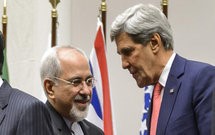 The interim nuclear deal signed between Iran and the P5+1 on 24 November 2013 was a definite breakthrough. It is the only nuclear deal to have been successfully concluded since the one reached with Rouhani at the negotiating table in the early 2000s, and detractors notwithstanding, it can be hailed as movement in the right diplomatic direction. It must also be remembered that this is an interim deal of six months – a sort of first step to cautiously gauge the opposition’s intentions while addressing concerns for a more conclusive resolution – without immediately tying either party to long-term commitments without proof of the other’s sincerity. This makes it a concrete starting point for further negotiations – of a kind that was previously missing.
The interim nuclear deal signed between Iran and the P5+1 on 24 November 2013 was a definite breakthrough. It is the only nuclear deal to have been successfully concluded since the one reached with Rouhani at the negotiating table in the early 2000s, and detractors notwithstanding, it can be hailed as movement in the right diplomatic direction. It must also be remembered that this is an interim deal of six months – a sort of first step to cautiously gauge the opposition’s intentions while addressing concerns for a more conclusive resolution – without immediately tying either party to long-term commitments without proof of the other’s sincerity. This makes it a concrete starting point for further negotiations – of a kind that was previously missing.
Certain preliminary questions/concerns can be raised about the contents of the deal, which have been widely covered in the media, their merits and demerits, and what they require of the parties involved.
Is the Rapprochement Genuine?
Can the possibility of Iran using the deal to buy itself time and further develop its nuclear weapons programme be completely done away with? Saudi Arabia and Israel, who, understandably, are none too happy with the way the meeting concluded in Geneva, have been vocal about the foolhardiness of the P5+1. Indeed, after the last successful nuclear deal with Iran, Rouhani himself admitted that the easing of diplomacy was concomitant with the growth of Iran’s nuclear programme. Would this then be a case of ‘fool me once, shame on you; fool me twice, shame on me’?
Can Sanctions Relief have Negative Implications?
Saudi Arabia and Israel have also commented on the possible negative implications of relief by lifting sanctions. Their contention is that lightening Iran’s economic burden will only create the space for the furtherance of Iranian weaponisation. One of the critical reasons for what could be seen as an artificially induced rapprochement between the West and Iran is the crippling effect of sanctions on the latter. In fact, reports state that Senator Kerry may have cited the peril of imminent sanctions passed by the US Congress – much like the sword of Damocles - to perhaps hasten the process. The message being, sign now or regret later. It was certainly a very effective approach. The point to be made here is this: if sanctions are finally fulfilling their objective of bringing about ‘acceptable’ behaviour, is this the right time to be easing them, especially without any guarantee that the gesture would be reciprocated?
That being said, the sanctions relief that has been promised under the aegis of this deal is limited, and is therefore going to have a limited effect on reversing the Iranian economy. Additionally, and crucially, these sanctions are reversible, which means that any sign of a less than stellar commitment to the clauses of the deal will result in the reinstatement of sanctions. This partial reprieve is really just a taste of what could be in store if Iran ‘behaves’. The above argument, therefore, can be just as easily invalidated as it is established.
Will the US Congress Pose a Challenge?
While sanctions relief may have been promised to Iran, how is the Obama administration going to overcome opposition posed by the Congress? The Congress is famously at odds with the White House over what an ideal nuclear deal with Iran should look like, and while the latter can lift sanctions that were imposed by a presidential order, any attempt to lift those imposed by Congress will be riddled with challenges. This interim deal has promised limited sanctions relief – oil and trade sanctions remain intact - which is doable, for now. But if there is to be a way forward – one which assures the other party of additional respite – how is the Obama administration planning to navigate it? Additionally, there is already talk of fresh sanctions against Iran as an expression of disappointment with the deal. Some members have warned that this may happen when Congress reconvenes in December this year. If this were to happen, it is difficult to envisage how rapprochement between the West and Iran will be reconciled with further penalties imposed by the US Congress.
The negotiations conducted in Geneva cannot be cast as a failure. An ideal deal was not on the cards because even the most initial steps had yet to be agreed upon. This deal lays the foundation to both test the commitment of the parties involved as well as build towards a genuine, long-term resolution. It is precisely the length of this deal that allows both parties to assess each other, and make a swift exit if the results don’t match expectations.
Courtesy : Institute of Peace and Conflict Studies (http://www.ipcs.org)